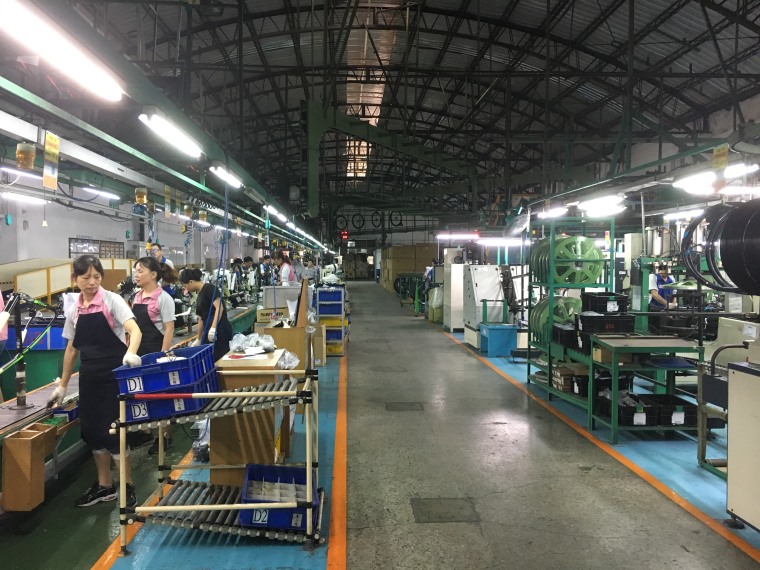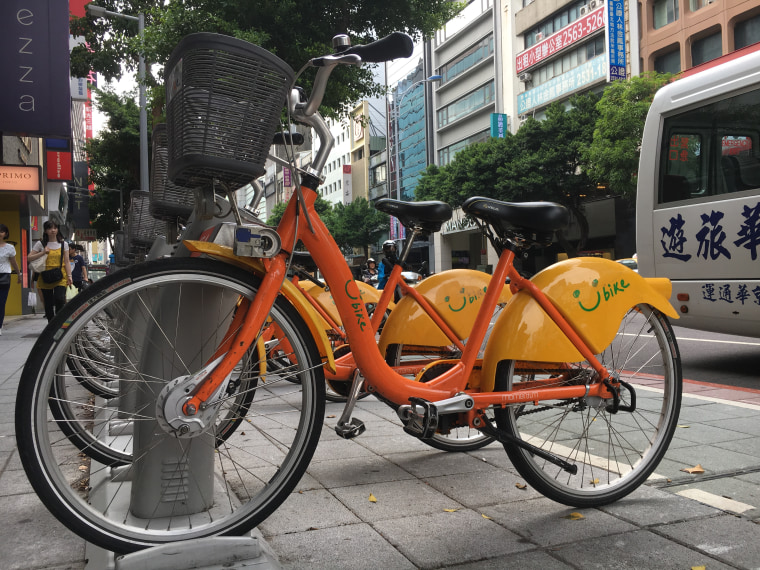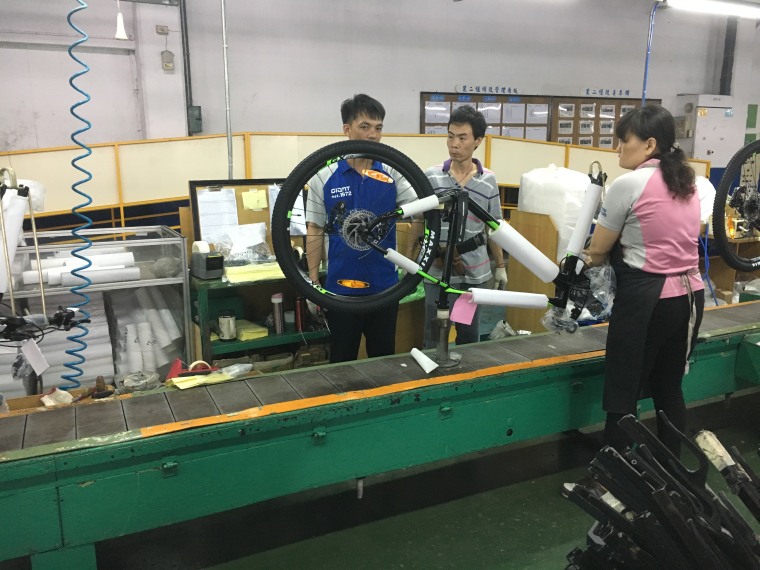TAIPEI, Taiwan — They’re as likely to be spotted in the Tour de France as they are on the street.
Founded 45 years ago in Taiwan, Giant Manufacturing has built bikes that have cycled terrain the world over. But before gaining its own name recognition, Giant got its start making orders for others, including Schwinn, one of the U.S.’s most well-known brands.
“At that time in Taiwan, nobody will ever think of making their own brand, if you are doing [exporting],” Bonnie Tu, who became Giant’s chairperson in January, told NBC News during a sit-down interview at Giant headquarters in Taichung, Taiwan. “I think most Taiwanese think you just make products for American or European companies.”
The reason I like to promote Liv is not because I want to sell more bicycles. It’s because when I’m riding the bicycle I feel so happy.
King Liu, Tu’s uncle, established Giant in 1972 with an investment of $4 million New Taiwan Dollars (the rough equivalent of US$ 133,000 as of publication) and 30-some-odd workers, according to the company’s timeline. That first year, Giant made and sold around 3,800 bikes.
When Tu, who studied English at Tamkang University in Taiwan, joined the business in 1978, Giant began producing a line of bikes called World Sport for the Schwinn Bicycle Company, according to Tu and Giant.
“After visiting them so many times, after they came to see our factory for many times, finally they gave us a small trial order,” Tu recalled.
Meanwhile, Giant started marketing under its own brand name, officially launching in Taiwan in 1981, Tu said. The company has since laid down roots all across the globe, including in Europe, Asia, North and South America, Africa, the Middle East, Australia, and New Zealand.

Giant also ended its agreement with Schwinn in 1991, a year before Schwinn filed for bankruptcy.
But breaking into the U.S. market, which Giant entered in 1987, took a great deal of time and patience, Tu said. Giant’s annual losses in the U.S. were around $5 million (plus or minus $1 million) until 2010, according to Tu, who served as the company's chief financial officer.
“For 23 years, we were drifting up and down,” she said.
Profit earned in China beginning in 1997, several years after Giant entered that market, helped to cover losses in the U.S, Tu added.
Giant focuses on research and development to make cycling fun, Tu said. Over the years, the company has experimented with different materials in its frame design. Tu said those include chromoly, a strong steel alloy made with chromium and molybdenum, and carbon fiber, a lightweight substance used in the fuselage and wings of planes.
The carbon fiber design, according to Giant, helps cyclists achieve high speeds, especially during a sprint. It worked for Tour de France 2017 King of the Mountains winner Warren Barguil, who Giant said rode a carbon fiber bicycle in that race on behalf of Sunweb, a German cycling team that uses Giant bikes.
Looking back at Giant’s nearly half century in the business, Tu said she credits its success to its ability to lead rather than follow.
“I think most Taiwanese companies can be very good, but at a certain point they will stop improving, and they do not reinvent themselves,” she said.
While Giant bikes headline famous races like the Tour de France, they can also be spotted on the streets of Taipei, Taiwan’s capital, as part of a public bike sharing program called YouBike. Giant began collaborating with the Taipei City Government’s YouBike program in 2012, according to the company.
The program has grown in popularity in this population-dense city of 2.7 million as a foil to a transportation culture long dominated by the fast, convenient, noisy, and exhaust-spewing scooter.
An increase in dedicated bike lanes, reasonable rental fees, and more than 230 docking stations and 7,700 bikes have made YouBike a sometimes attractive alternative to subways and buses, as well as scooters and cars, customers say.
To date, YouBike has logged more than 89 million rentals, according to a tally on its website.
“It’s very convenient and you can also get your exercise in,” Chia-ling Ye said in Mandarin while docking her bike with a friend outside the Zhongshan subway station one afternoon in late August.
Jen-hao Ou, another customer who uses YouBike once a week, agreed in part with Ye.
“It’s a handy transportation tool for short distances,” Ou said, though he added that the hot, muggy summer weather and crowded traffic conditions in Taipei pose challenges for longer distances.

While Giant in its first half-year financials reported double-digit sales growth in local currency for its private brand in Europe and the U.S., the company’s revenue dropped by 7.4 percent to NT$26.9 billion (US$892 million) compared to the same period last year, according to a company news release in August.
Net income before and after taxes were NT$1.65 billion (US$547.1 million) and NT$1.19 billion (US$394.6 million) respectively for the first six months, a drop of 29.5 percent compared to the same period last year.
The statement attributed profit loss chiefly to unfavorable currency exchange rates. Giant also said its company in China suffered adversely from a continued slump in the Chinese market and also from bike sharing there.
But in Europe, Giant’s growth came primarily from hot-selling electric bicycles, while mountain and road bikes did well in the U.S., the financial report said. The U.S. market, according to Giant, has also responded favorably to its electric bikes, which many in the industry view as the next big thing in cycling.

A company spokeswoman said around 30 percent of bicycles made by Giant today are for other companies.
Tu said she’s also proud of a women’s line of bikes she created for Giant in 2008 called “Liv.” The need became apparent, she said, after joining a cycling event across Taiwan. The quality of the women’s bike she rode and the cycling outfit she wore made for a tough go, Tu said.
“So I started to think why don’t we have a decent bike for female[s] and why [do] I have to wear a man’s clothes,” she explained. “This is also not right.”
Liv has proven successful in many English-speaking countries, Tu said, including Canada, Australia, the United Kingdom, and the U.S. It’s also been a hit in France, she added. Total sales revenue for 2016 was over US$100 million, according to Tu.
At the age of 68, Tu herself has become an avid cyclist, riding everywhere every chance she gets, she said.
For 23 years, we were drifting up and down.
“The reason I like to promote Liv is not because I want to sell more bicycles,” she explained. “It’s because when I’m riding the bicycle I feel so happy. And after I ride I feel more confident, and I feel more [in] control of everything.”
Even after being in the bike business for so long, Giant still surprises some analysts when they learn it’s a company from Taiwan, Tu said.
For many Taiwanese Americans already in the know, Giant’s success story is a bright spot and source of pride.
“That makes me feel very honored,” Tu said. “But [it] also reminds me I have to work harder, that Giant has to keep up the good work, that I shouldn’t let them down.”
Follow NBC Asian America on Facebook, Twitter, Instagram and Tumblr.
